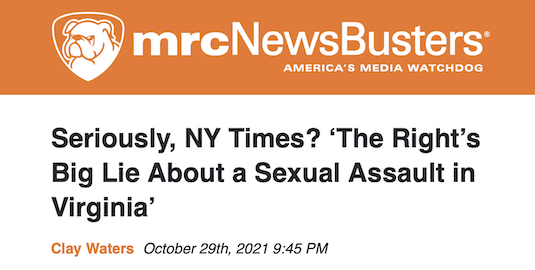Topic: Media Research Center
 We've documented how the Media Research Center spent weeks hyping an alleged sexual assault by a student in a school in Loudoun County, Va., on another student for two reasons: to advance its anti-transgender agenda (since the alleged assaulter was described as "a boy in a skirt") and to help get a Republican, Glenn Youngkin, elected Virginia governor. But it turns out that the MRC has been effectively censoring the full truth about the alleged assault. Katelyn Burns wrote at MSNBC:
We've documented how the Media Research Center spent weeks hyping an alleged sexual assault by a student in a school in Loudoun County, Va., on another student for two reasons: to advance its anti-transgender agenda (since the alleged assaulter was described as "a boy in a skirt") and to help get a Republican, Glenn Youngkin, elected Virginia governor. But it turns out that the MRC has been effectively censoring the full truth about the alleged assault. Katelyn Burns wrote at MSNBC:
The Youngkin campaign has taken an incident at a Loudoun County school that involved a student sexually assaulting a classmate in a girl’s bathroom and twisted it into an effective campaign talking point. This, Youngkin and his supporters in right-wing media have trumpeted, is the mythical unicorn of the trans bathroom panic. The one case, they thought, that would finally help sway the public on the trans bathroom issue they’ve been unsuccessfully pushing since 2015.
But the facts of the case don’t match up with the trans stranger danger happening that they have painted it to be. The sexual assaulter didn’t lie secretly in wait for his victim to unknowingly enter the stall next to him. Instead the meetup was arranged beforehand. The attacker and victim had had sex in the same bathroom before. This time, however, the girl said no, and the boy didn’t stop. The crime is no less awful, and should be outright condemned. But it was not the attack facilitated by a trans-friendly bathroom policy as conservatives claimed it was.
Of the numerous articles the MRC has published referencing the assault, we could find only two that referenced the fact that the students previously had consenual sexual relations and that the incident in which the assault allegely occurred started out as consensual.
An Oct. 25 item by Nicholas Fondacaro complained that a Washington Post article on the case was "stealth-edited" to remove the claim that the assaulting student was "gender-fluid," further complaining that the article "seemed to hint that the girl wasn’t really a victim because “the 15-year-old victim in the first case testified she had consensual sexual encounters with the defendant on two occasions in a girls’ bathroom…” In fact, the edit reflects the reality of the case and that it's much more complicated than the "depraved transsexual" narrative Fondacaro and the MRC would like to impose on it for political reasons.
(Of course, Fondacaro didn't mention the MRC's own record of stealth-editing articles, making his complaint more than a tad hypocritical.)
THe only other instance was an Oct. 29 post by Clay Waters, who quoted the facts of the case as reported in a New York Times article in an attempt to accuse the Times of trying to "neutralize the story." Waters didn't comment on the part of the article he excerpted stating that "testified that she’d previously had two consensual sexual encounters with her attacker in the school bathroom. On the day of her assault, they’d agreed to meet up again…." but he was ultimately forced to admit that the incident happened months before the school board voted on "trans bathroom policies" -- which undermines a key attack line right-wingers have been using.
Still, Waters insisted on whining: "The Loudoun County school board’s shameful silence; the possibility the assault was hushed up to avoid the wrath of trans activists; the gross irresponsibility of allowing boys free access to girl’s safe spaces in the first place….all these points Goldberg studiously ignored in the name of chipping away at a story that may prove devastating to the election hopes of Terry McAuliffe." Waters didn't mention how he and his fellow right-wing activists were hyping the story in an attempt to boost the election hopes of Youngkin.
As Waters continued to huff about the Times calling the right-wing narrative abaout the assault a "big lie," he is certainly not going to concede that the MRC's near-complete refusal to tell its readers the full facts of the case is a lie by omission.
Censoring information that interferes with a political narrative is not exactly a hallmark of credible "media research," is it?








